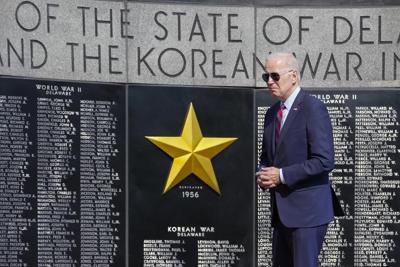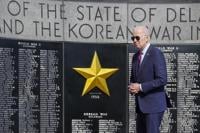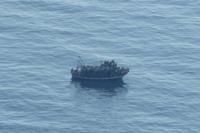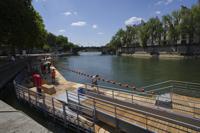WASHINGTON (AP) 鈥� President Joe Biden has nominated a highly decorated Marine officer who has been involved in the transformation of the force to be the next Marine Corps commandant.
The nomination of , now the assistant commandant, had been widely expected and has been forwarded to the Senate. The current top Marine, Gen. David Berger, is wrapping up his four-year term and preparing to retire.
Smith, a career infantry officer, has commanded at every level, serving multiple tours in Afghanistan and Iraq, and Ramadi during heavy combat in 2004 and 2005 in Operation Iraq Freedom. He later was the senior military adviser to Defense Secretary Ash Carter and in in 2019 took over as the deputy commandant for combat development.
In that post, Smith worked with Berger on a broad campaign to transform the Marine Corps to better be able to fight amphibious wars in the Pacific after years of battling terrorist groups in the Middle East. The plan was lauded by many in the Pentagon and Congress as a critical way for the Marines to prepare for a potential conflict with China.
Smith and Berger argued that the changes will improve the Marine Corps鈥� ability to fight in contested areas, particularly within striking range of an enemy. That element is critical in the Indo-Pacific, where thousands of U.S. and allied forces are easily within missile 鈥� or even rocket 鈥� range of both China and North Korea.
But some of the moves, including the transfer of Marine tanks to the Army, triggered sharp criticism from a group of retired Marine generals.
During a speech at a naval conference in February, Smith defended the decision as critical to modern warfare against highly capable enemies.
鈥淚 love tanks, I used them in Iraq, I used them in Afghanistan,鈥� Smith said. But he said they are more vulnerable and can't move quickly enough to avoid new, high-tech attacks.
鈥淲hen an enemy can hit a tank 90 kilometers away with long-range fire,鈥� he said, 鈥淚 can鈥檛 move them on time to be in a position to do something that I need them to do ... . It鈥檚 not that they鈥檙e bad, it鈥檚 that I can鈥檛 afford to use them in my current mission.鈥�
Smith was promoted to four-star general in 2021 and took over as assistant commandant, where he has focused on recruiting, retention and managing the development of Marine forces.
amid low U.S. unemployment and steep competition from private industry, This year the Marine Corps is expected to be the only service to meet its recruiting goal, though leaders still worry about the ongoing challenge.
Still, Smith, in February, dismissed the need to provide large bonuses in order to attract new recruits.
鈥淪ome say we should be giving out recruiting bonuses. We don鈥檛 give recruit bonuses,鈥� he said, noting there are some exceptions for individuals with very special skills. 鈥淭he reason that we don鈥檛 get bonuses? Your bonus is you get to call yourself a Marine. That鈥檚 your bonus, right? There鈥檚 no dollar amount that goes with that.鈥�
Instead, he has talked about providing bonuses to retain Marines in order to keep them from leaving after their first tour. That, he said, would help fill a deficit of Marines with five years to nine years in service. Rather than struggle to find more people who leave after four years, he said they should find ways to make it more attractive for Marines to reenlist by providing more stability in where they are stationed, more training and expanded job choices.
Smith grew up in Plano, Texas, and was commissioned as a second lieutenant in 1987 through the Naval Reserve Officers Training Corps program at Texas A&M University. His combat awards include the Defense Distinguished Service Medal, the highest noncombat award; the Legion of Merit, a Bronze Star with a V for combat valor, and a Purple Heart.








































